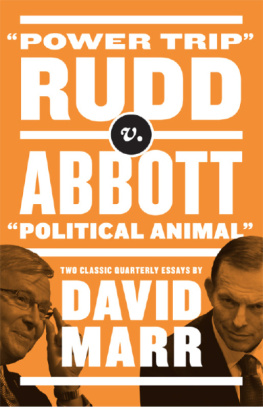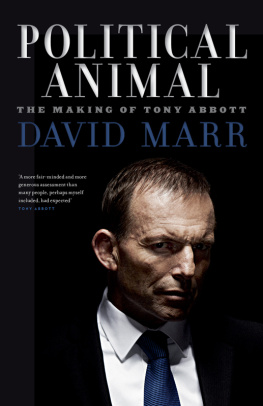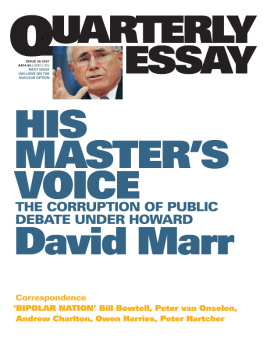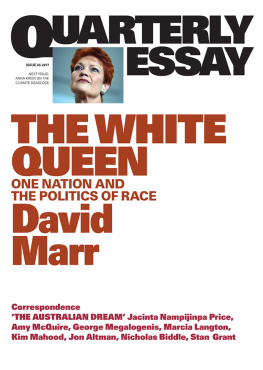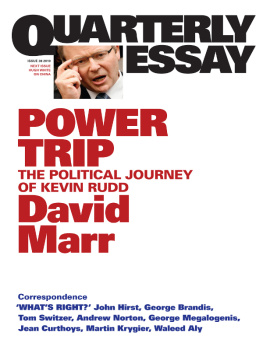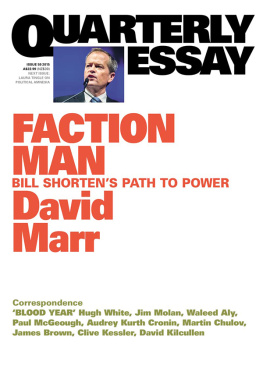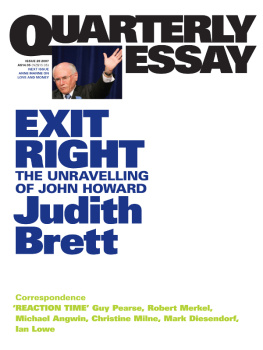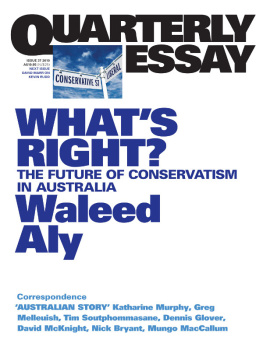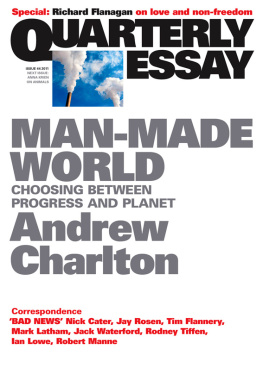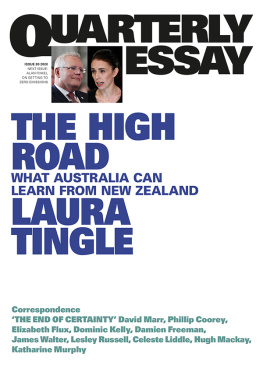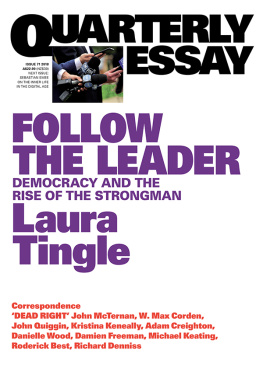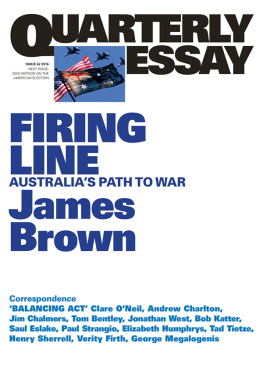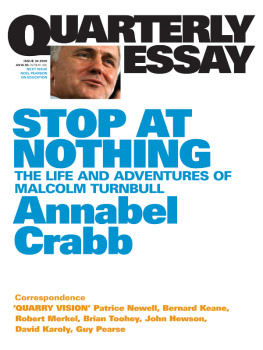THE ONLY CAB ON THE RANK
The cardinal was floundering. I dont think we should be scapegoated. Well answer for what weve done, for what weve done. Were not trying to defend the indefensible. But lets He paused. Right across the board lets see. By turns he was weary and defiant. He complained. He wandered off into the far reaches of Catholic history. Once mentioned, the victims were all but forgotten. Journalists crowded into that plain room in Polding House could not believe what they were seeing. This man had been a bishop for twenty-five years, a cardinal for ten, archbishop in turn of Australias two biggest cities and a big figure in Rome since the time of John Paul II. He had faced tough press conferences before, but the day after Julia Gillard announced a royal commission into the institutional abuse of children George Pell was falling apart in front of the cameras.
He had suffered a mighty defeat. For twenty years, in the face of growing public anger about paedophile priests, political leaders had backed the Catholic Church. Despite protests from victims, their parents, Anglican bishops, lawyers, academics, child protection advocates, a number of Catholic priests, newspapers and police, the business of cleaning up the mess of child abuse had been left to the churches themselves. When Pell provoked an outcry by walking the paedophile Gerald Ridsdale into court in 1993, Jeff Kennett hosed down calls for a royal commission. When Pell was accused himself of abusing boys, John Howard blocked calls for a royal commission. When the former archbishop of Brisbane, Peter Hollingworth, was forced to resign as governor-general his fall provoked by his muddled response to paedophilia in Anglican ranks his own church called for a national inquiry. Howard again refused. Pell concurred: It is not at all clear to me that we need a royal commission. He never saw the need for the state to investigate the churches, particularly his own. When a nine-year inquiry uncovered the rot in the church in Ireland, Pell was on hand to claim nothing like it was needed here. Ireland is not Australia.
But after Ireland the political protection offered the churches in Australia began to falter. How such old understandings, taken for granted for so long, begin to break down is all but impossible to track. A few cracks appear, a floor sags, and then one day the whole house collapses. The appalling record of the church in Ireland entered the local imagination. This was not Belgium or Spain but the mother country of Australian Catholicism. The crimes were not all in the past and their concealment was contemporary. In July 2011, a week after the publication of a report on the church in Cork, the Irish prime minister, Enda Kenny, delivered a blast heard around the world:
The revelations of the Cloyne Report have brought the Government, Irish Catholics and the Vatican to an unprecedented juncture because for the first time in Ireland, a report into child sexual-abuse exposes an attempt by the Holy See to frustrate an Inquiry in a sovereign, democratic republic as little as three years ago, not three decades ago. And in doing so, the Cloyne Report excavates the dysfunction, disconnection, elitism, the narcissism that dominate the culture of the Vatican to this day. The rape and torture of children were downplayed or managed to uphold, instead, the primacy of the institution, its power, standing and reputation.
Seven months later, the premier of Victoria, Ted Baillieu, received a report on protecting vulnerable children by the retired Supreme Court judge Philip Cummins. He had not been asked to investigate the role of the churches but suggested it was time someone did: There is a strong public interest in the ascertainment of whether past abuses have been institutionally hidden, whether religious organisations have been active or complicit in that suppression, and in revealing what processes and procedures were employed. Six weeks later, the pressure on the Baillieu government to hold an inquiry became irresistible when the Age published a confidential police report accusing the Catholic Church of protecting paedophiles and showing little sympathy for their victims. Victoria Police linked forty suicides in the state to abuse by half a dozen priests and brothers alone. Detective Sergeant Kevin Carson wrote: It would appear that an investigation would uncover many more deaths as a consequence of clergy sexual abuse.
Baillieu was moderately brave. He announced not a royal commission but a parliamentary Inquiry into the Handling of Child Abuse by Religious and Other Organisations. Pell said he was willing to appear. As the inquiry was about to begin public hearings in October last year, Victoria Police accused the Melbourne archdiocese of the Catholic Church of hindering investigations, protecting priests, silencing victims and failing to proactively seek out offenders. They also attacked the process Pell had put in place in Melbourne in the 1990s to inquire into abuse and compensate victims:
Victoria Police has serious concerns regarding the terms of this inquiry process and its appearance as a de facto substitute for criminal justice. As noted on its website, the Melbourne Response has made a number of ex gratia payments to victims. In spite of this, it has not referred a single complaint to Victoria Police.
This was damaging. That police in Victoria were no longer willing to protect the church as they had, vigorously, for a very long time was a key to the breakdown of old understandings across Australia that the Catholic Church could be left to look after its own. Pell was affronted by this volte-face . He shrugged off calls for his resignation. Then a disgruntled detective chief inspector from Newcastle, Peter Fox, turned on the church in New South Wales. On 8 November last year he published an open letter to the premier, Barry OFarrell:
I have investigated so many sexual assaults in my thirty-five years of policing Ive lost count. Having spent most of those years at the coal face I have seen the worst society can dredge up, particularly the evil of paedophilia within the Catholic Church
I can testify from my own experience that the church covers up, silences victims, hinders police investigations, alerts offenders, destroys evidence and moves priests to protect the good name of the church. None of that stops at the Victorian border the whole system needs to be exposed; the clergy covering up these crimes must to be brought to justice and the network protecting paedophile priests dismantled. There should be no place for evil or its guardians to hide.
When OFarrell announced a modest inquiry into police work in the Newcastle region, there were frustrated cries from all sides for a royal commission. Pell counter-attacked, first in a feisty interview he gave the Australian and then next day in his weekly column in Sydneys Sunday Telegraph . That morning in St Marys Cathedral he preached against royal commissions, and on the steps afterwards he told the press such things werent needed to bring justice to victims. Hadnt the church apologised and set up procedures for redress? I think it needs to be demonstrated that there is maladministration and corruption on a wide scale before there is any general royal commission.



